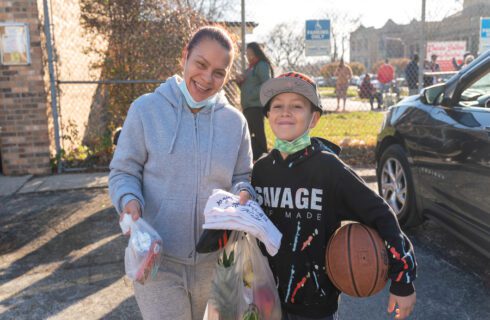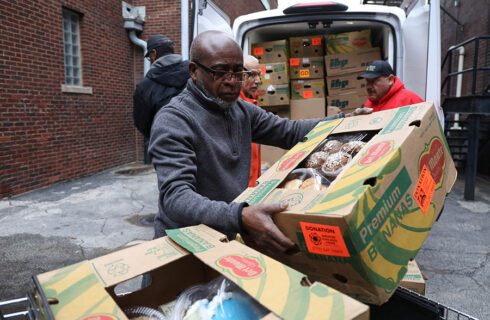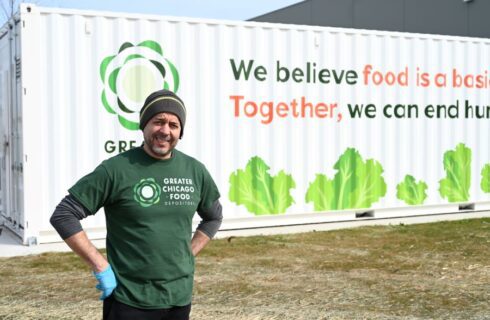After serving two combat tours in Afghanistan and two more in Iraq with the U.S. Army, Chicago native Brian McRae returned home in 2007 to no family, no job and no home.
Soon he was spending his nights at the Pacific Garden Mission, a shelter on Chicago’s Near West Side, while receiving daytime help at Matthew House, a Bronzeville organization dedicated to helping those experiencing homelessness. He mostly depended on shelters for food, which often left vast stretches of hunger between hot meals. Had McRae been able to use Supplemental Nutrition Assistance Program (SNAP) benefits for a prepared meal at a restaurant or grocery store, the military veteran would have had another option for nourishment upon coming home. “It was devastating,” said McRae, 41, who is now a program supervisor at Matthew House after working his way up from a volunteer position. “I would hate to see another veteran, or any individual for that matter, in the situation that I was in.” McRae was among the Greater Chicago Food Depository’s 200 or so anti-hunger advocates who traveled to Springfield this week to advocate for legislation that will reduce food insecurity in Illinois. The Food Depository strongly supports the passage of House Bill 3343, sponsored by Rep. Sonya Harper, D-Chicago, which would allow SNAP recipients who are elderly, disabled or experiencing homelessness to use their benefits to buy hot food at grocery stores or restaurants that opt in to the program. Also known as the Restaurant Meals Program bill, the bill recently passed by overwhelming margin in the Illinois House and Senate. Now, it awaits the signature of Gov. J.B. Pritzker. “This bill provides greater choice for our most vulnerable residents,” said Sophie Milam, senior director of public policy for the Food Depository. “We know through our own work and network of partners how challenging it can be to reach these populations. This bill will give them improved options for food access.” The Food Depository stands with other notable Chicago charities that serve low-income people, including the Chicago Coalition for the Homeless, Heartland Alliance and the Sargent Shriver National Center on Poverty Law, in its advocacy for the common-sense legislation.
Nolan Downey, attorney for the Sargent Shriver National Center on Poverty Law
“Having that option where they can go to a grocery store and get a rotisserie chicken or go to one of these restaurants and get a meal – it’s the difference between eating and not eating,” Downey said.Though the restaurant meals program is allowed by the U.S. Department of Agriculture, which oversees SNAP, it’s only been implemented in a handful of states so far, according to a recent Chicago Tribune story. Arizona’s program is statewide, whereas California’s and Rhode Island’s programs are limited to specific counties. Legislation isn't required for states to opt into the program, but it can protect the program from changes in state administration, the Tribune story noted. "Arizona opted in without legislation because it's a critical program to end hunger for our state's most vulnerable people," said Ashley St. Thomas, public policy manager for the Association of Arizona Food Banks. More than 500 restaurants and retailers participate in the program, which is particularly important in the dangerous summer heat of Arizona, St. Thomas said. The Illinois Department of Human Services, which administers SNAP for the 1.8 million people in Illinois who receive benefits, already screens for people who are elderly, disabled or experiencing homeless, Downey said. Recipients who qualify would be able to buy the hot food with their LINK cards. “If you were a SNAP recipient who is not eligible for this option and you went to try to use it, the transaction would be denied in real time,” Downey said. Those who are working on the frontlines of food insecurity in Chicago and throughout Cook County say the prepared meals program is much needed. La Casa Norte in Humboldt Park opened a food pantry in March and tries to have ready-to-eat options for its clients, said Marisa DiPaolo, 23, a nutrition center assistant at La Casa Norte in Humboldt Park. But people experiencing homelessness – as well as the elderly and people with disabilities – need more options for hot meals than any food pantry can provide, DiPaolo said. “SNAP benefits are supposed to improve access to food, right?” DiPaolo said. “There’s no reason that this population shouldn’t be able to access prepared food.” Theresa Boles is a cook at Franciscan Outreach, one of Chicago’s oldest and largest shelters for men and women experiencing homelessness. Boles was one of the Food Depository’s advocates in Springfield this week.

Theresa Boles, a cook at Franciscan Outreach, is one of the Food Depository's anti-hunger advocates.
“A cold meal is good, too,” said Boles, 56. “But when you can have a hot meal, especially in the cold months of Chicago, it’s good to have.”As for McRae, the Army veteran now working at Matthew House, he’s hoping to help others have an important option for a hot meal that he didn’t have when he returned from military service. “Once you get a step up,” McRae said, “you always want to hold the elevator door for someone else.”
Share This Post



